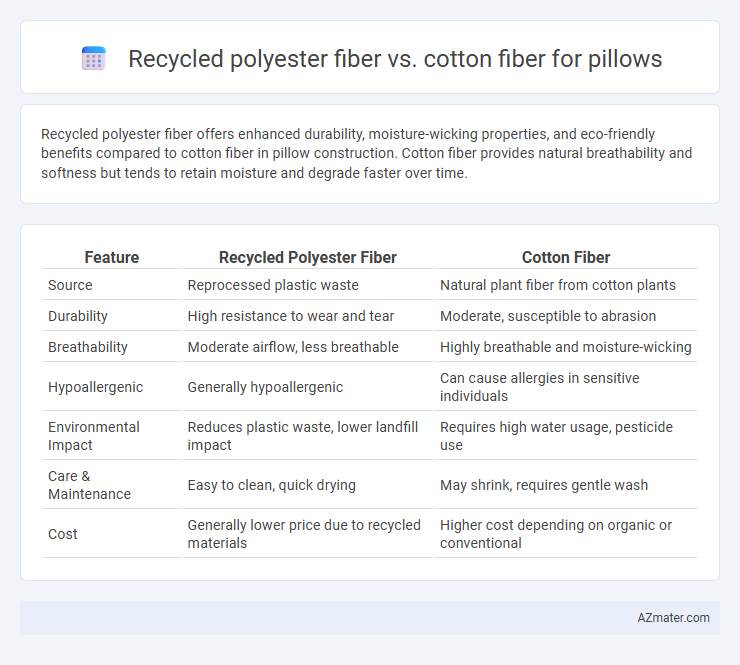Recycled polyester fiber offers enhanced durability, moisture-wicking properties, and eco-friendly benefits compared to cotton fiber in pillow construction. Cotton fiber provides natural breathability and softness but tends to retain moisture and degrade faster over time.
Table of Comparison
| Feature | Recycled Polyester Fiber | Cotton Fiber |
|---|---|---|
| Source | Reprocessed plastic waste | Natural plant fiber from cotton plants |
| Durability | High resistance to wear and tear | Moderate, susceptible to abrasion |
| Breathability | Moderate airflow, less breathable | Highly breathable and moisture-wicking |
| Hypoallergenic | Generally hypoallergenic | Can cause allergies in sensitive individuals |
| Environmental Impact | Reduces plastic waste, lower landfill impact | Requires high water usage, pesticide use |
| Care & Maintenance | Easy to clean, quick drying | May shrink, requires gentle wash |
| Cost | Generally lower price due to recycled materials | Higher cost depending on organic or conventional |
Introduction to Pillow Filling Materials
Recycled polyester fiber and cotton fiber are two common pillow filling materials with distinct properties affecting comfort and sustainability. Recycled polyester fiber offers durability, moisture resistance, and hypoallergenic benefits, making it ideal for allergy sufferers and those seeking eco-friendly options from plastic waste. Cotton fiber provides natural breathability and softness but may retain moisture and requires more frequent cleaning to maintain freshness.
Overview of Recycled Polyester Fiber
Recycled polyester fiber, derived from post-consumer plastic bottles and textile waste, offers a sustainable alternative to traditional cotton fiber in pillow manufacturing. This synthetic fiber is highly durable, moisture-wicking, and resistant to mold and mildew, enhancing pillow longevity and hygiene. Compared to cotton, recycled polyester requires less water and land during production, reducing environmental impact and promoting circular economy principles.
Characteristics of Cotton Fiber
Cotton fiber, derived from the seed hairs of the cotton plant, is renowned for its natural breathability and softness, making it ideal for pillow use. Its high moisture absorption enhances comfort by wicking away sweat, though it tends to retain dampness longer than synthetic fibers like recycled polyester. Cotton's biodegradability and hypoallergenic properties provide an eco-friendly and skin-sensitive option, contrasting the durability and quick-drying features of recycled polyester fiber.
Environmental Impact: Recycled Polyester vs Cotton
Recycled polyester fiber significantly reduces environmental impact by utilizing post-consumer plastic waste, lowering landfill contributions and decreasing reliance on fossil fuels compared to virgin polyester production. Cotton fiber, while biodegradable, requires extensive water usage, pesticides, and arable land, contributing to soil depletion and water pollution. Choosing recycled polyester fibers for pillows supports waste reduction and conserves natural resources more effectively than conventional cotton cultivation.
Comfort and Feel: Which Fills Better?
Recycled polyester fiber in pillows offers superior resilience and moisture-wicking properties, ensuring a consistently plush and supportive feel that retains loft over time. Cotton fiber provides a natural, breathable softness that enhances comfort but tends to compress more quickly, potentially reducing long-term fluffiness. For optimal pillow fill combining durability and cozy comfort, recycled polyester fiber generally outperforms cotton fiber in maintaining shape and cushioning.
Durability and Longevity of Fibers
Recycled polyester fiber outperforms cotton fiber in durability and longevity for pillows due to its resistance to wear, moisture, and mildew, maintaining shape and support over time. Cotton fibers, while soft and breathable, tend to break down faster with frequent washing and exposure to humidity, leading to reduced lifespan. The synthetic structure of recycled polyester ensures consistent performance and longer product life, making it an ideal choice for long-lasting pillow fillings.
Hypoallergenic Properties Comparison
Recycled polyester fiber in pillows exhibits superior hypoallergenic properties compared to cotton fiber due to its resistance to dust mites, mold, and mildew, which commonly trigger allergies. Cotton fibers are more prone to retaining moisture and harboring allergens, increasing the risk of allergic reactions in sensitive individuals. Choosing recycled polyester fiber pillows enhances allergy management by providing a cleaner, more allergen-resistant sleeping environment.
Maintenance and Care Requirements
Recycled polyester fiber pillows require minimal maintenance with machine-washable covers that dry quickly and resist shrinking or wrinkling, making them ideal for easy care. Cotton fiber pillows need gentle washing to prevent fabric damage and typically require air drying or low-heat settings to maintain softness and shape. Both fibers benefit from regular fluffing to preserve pillow loft, but recycled polyester offers superior durability against repeated washing and moisture exposure.
Cost and Market Availability
Recycled polyester fiber offers a cost-effective alternative to cotton fiber, with prices often 20-40% lower due to lower raw material expenses and scalable manufacturing processes. Market availability of recycled polyester fiber is expanding rapidly, driven by rising demand for sustainable textiles and increasing production capacity from recycling facilities worldwide. Cotton fiber, while widely available, faces higher price volatility and sustainability concerns, influencing manufacturers to increasingly prefer recycled polyester in pillow production for both economic and ecological benefits.
Conclusion: Choosing the Right Fiber for Your Pillow
Recycled polyester fiber offers durability, moisture resistance, and eco-friendly benefits by reducing plastic waste, making it ideal for hypoallergenic and long-lasting pillows. Cotton fiber provides superior breathability, natural softness, and biodegradability, perfect for those prioritizing comfort and sustainability. Selecting the right pillow fiber depends on balancing environmental impact, personal comfort preferences, and maintenance needs.

Infographic: Recycled polyester fiber vs Cotton fiber for Pillow
 azmater.com
azmater.com